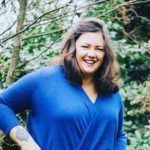There is no way I would have been able to get sober without other people. I tried many times on my own and failed. But I don’t think just anyone could have helped me; they had to be in recovery. They had to have walked my journey. There’s a striking contrast between the life I led before recovery (one of solitude, isolation and desperate loneliness) and this new sober life. I don’t think I’d be nearly six years sober without building connections with other people in recovery.
The Isolation of Substance Use Disorder
When I began treatment, I was a broken and deeply pained woman. My substance use disorder had shattered any semblance of a life, and I was left with a painful existence of using and finding ways to use more. I didn’t want to live like that, but I didn’t know how to stop either. I tried to stop using on my own so many times, only to fail and go back to the drink and drugs in a way that was worse than ever before. I couldn’t understand why a woman who had gone through many challenging life events couldn’t overcome addiction.
How I Moved Out of Isolation into Connection
Things changed when I walked into my first AA meeting. I was met with something I’d never felt before: connection. In in her book, the Gifts of Imperfection, Brené Brown says:
“I define connection as the energy that exists between people when they feel seen, heard, and valued, when they can give and receive without judgment, and when they derive sustenance and strength from the relationship.”
Finally, after a decade of addiction, I felt accepted. I was among my people who were speaking my story and had felt my pain. They had trudged my path. They listened to me without judgement and held me compassionately. These people, these complete strangers, showed me the love and understanding that I’d so desperately needed during my substance use disorder. I finally felt a sense of belonging, and of connection.
How I Built Connections
If there’s one tip I would give to people new in recovery, it would be this: foster these new relationships with people in recovery like your life depends on it. It does in those first few months. These relationships are the bedrock of a sustainable recovery; they’re the people you call when you’re struggling. They’re the people who understand your struggles and can offer their insight or just hear you. They’re the people who tell you they know how hard recovery is and that you’re doing a great job. They’re the people who you call when you can’t sleep; and they’re the people that remind you how important it is to take care of yourself. They are your tribe, and they ground you in recovery. Without them, you can become disconnected from recovery be faced with new challenges like loneliness and isolation, which can lead to relapse.
Here is how I built connections:
- I found support groups of people in recovery, initially in AA and NA and now in Refuge Recovery. I regularly attend these groups to share my thoughts and feelings and hear others.
- I attend workshops with people who speak my language: mindfulness, Buddhism, trauma recovery, and living well in recovery to expand my recovery tools, learn, and grow.
- I have a small group of friends that I call every day. They know what’s going on with me, they hold me accountable, and they check in on me.
- I learn how to connect with myself and be comfortable with being alone. Through mindfulness meditation and quiet time, I have developed the ability to connect with my body, quiet my mind, and restore a sense of peace (most of the time). It’s important to be able to self-soothe in recovery.
I love the way Brené describes the connection as an energy. I’d go as far as to say that connection is a synergy. Alone these people have endured great struggles, but together they are a much more powerful force that can overcome the beast of substance use disorder. That is what I’d been missing for so long.
“Spirituality is recognizing and celebrating that we are all inextricably connected to each other by a power greater than all of us, and that our connection to that power and to one another is grounded in love and compassion. Practicing spirituality brings a sense of perspective, meaning and purpose to our lives.”
–Brené Brown, The Gifts of Imperfection
Communities can be also be found in the drug treatment centers. Yonkers drug and alcohol detox centers provides support as well as those around the nation.

The Recovery Village aims to improve the quality of life for people struggling with substance use or mental health disorder with fact-based content about the nature of behavioral health conditions, treatment options and their related outcomes. We publish material that is researched, cited, edited and reviewed by licensed medical professionals. The information we provide is not intended to be a substitute for professional medical advice, diagnosis or treatment. It should not be used in place of the advice of your physician or other qualified healthcare providers.